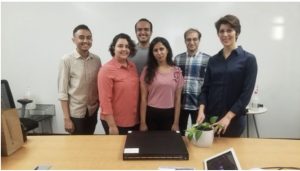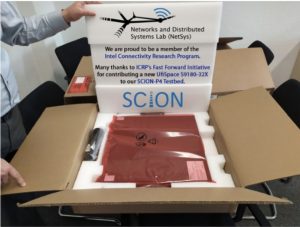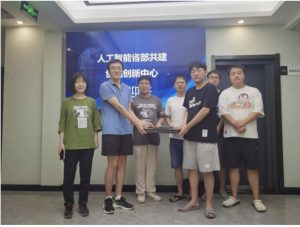Intel has steadfastly supported academic research throughout the years, and we are always looking for new ways to spur creativity and enable innovative projects. When conducting groundbreaking research, researchers bear the burden of proving that their solution can solve a network-wide problem and to do that, they need to acquire more and more costly equipment, which is often beyond the budget of most universities.
The Intel® Connectivity Research Program’s (ICRP) Fast Forward Initiative (FFI) is a grant program designed to help academic researchers by expanding the number of P4-programmable devices in their labs. To do that, we allocated funds to purchase systems and provide additional deep academic discounts for the research teams working on promising projects. With this new equipment, these teams will be able to expand their research by allowing more researchers to work on different projects, build bigger test networks, generate more traffic and launch exciting new research ventures. Based on the wonderful results of the FFI’s first round, conducted in 2021, we are excited to continue the program this year.
Last year, the FFI received over 40 applications and awarded the 13 winning programs with Intel® Tofino™-based systems. Together with our partners, APS Networks, Netberg, and STORDIS, we shipped the systems to the winning teams in all four corners of the world: Chile and Brazil in the South; Canada and Sweden in the North; the US, UK, and Germany in the West; and China, India, and Singapore in the East. These systems have been installed and utilized for new and exciting networking research. This support has led to many successful endeavors such as machine-learning efforts in Zheijang University in China and innovative source-routing POLKA protocol at the Universidade Federal do Espirito Santo in Brazil. Additionally, FFI helped to further research in advanced network telemetry at John Hopkins University and complex processing being offloaded on the switch at IIT Bombay. These are only a few projects that have benefitted from the ICRP’s new initiative. Learn more about other works produced by ICRP participants here.
A Glimpse at the FFI's 2021 Successes
The Universidade Federal do Espírito Santo in Brazil installed our Intel® Tofino™ Expandable Architecture-based system and implemented it as a part of the global testbed, with the software coming from the RARE/freeRtr project. They will also use the system in their demonstration at the Super Computing conference (SC22).

Protessor Souden Ghorbanis group from John Hopkins University in the US plans to use their system to perform the research in the real-time congestion management using Intel Tofino Expandable Architecture-based system's high-precision timers and data export capabilities that will allow them to detect and act on the short-lived traffic surges.

A research group from Otto-von-Guericke University in Magdeburg, Germany plans to use the donated system for their continued research and improvement of the SCION protocol, making it more practical and efficient to implement on high-speed switches.

Upon receiving the system, Professor Zeke Wang from Zhejiang University in China, wrote us saying, “Thanks again for your donation. I am looking forward to getting involved in the next rounds of the Fast Forward Initiative.” His communication also included this wonderful picture of his group and the system.

Encouraged by the success of the program, Intel decided to continue it this year. In fact, I am happy to announce the launch of the Fast Forward Initiative 2022 (FF\'22). In collaboration with our partners, we have acquired a number of Intel Tofino Expandable Architecture-based hardware systems that we are ready to donate to more inspiring research programs. Beyond the donated hardware, program participants will be able to acquire additional systems at a generous academic discount, made possible in part by Intel® chipset donations.
You can now join this innovative family by submitting your application here.
To learn more about Intel Connectivity Research Program read the previous blog post or visit our page.

